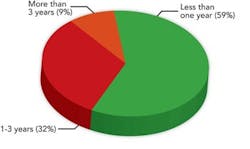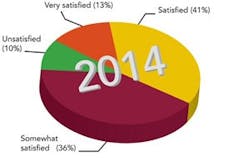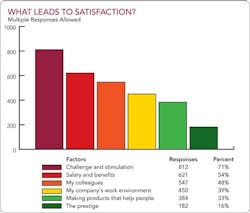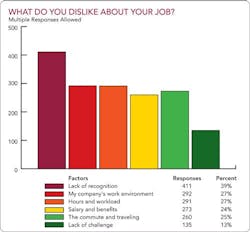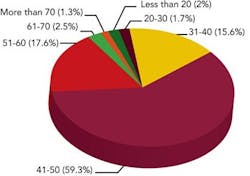"I work for the best company in the world. We are well taken care of and as a result we strive to make our company and client successful," says one respondent of Chemical Processing's 2014 Salary and Job Satisfaction Survey. This is the "golden job" everyone strives to find. And while not all respondents shared the same sentiment towards their jobs, many noted they were happy or at least content with their salaries and their work. And they have good reason to be. Over the past five years, we've seen salaries reach their highest level, plummet during the recession and then slowly but surely edge back up. This year the average salary for a chemical engineer jumped to $107,187 (from $104,884 last year), the highest it's been since 2009, when respondents reported earning an average $107,804 (Table 1).
Want to see more of the data we collected? Interested in what all of the survey respondents had to say? Check out all the comments regarding advice for aspiring chemical engineers and the industry's public outlook, and view more salary survey graphs and data. You must be a member to view this web-exclusive material, but becoming a member is simple and free, and will give you instant access. Members also can comment on this article (and other posted content); we'd love to hear what you have to say.
Give me more data.
Give me more comments.
Review Past Surveys
Chemical Processing has been conducting a salary/job satisfaction survey for 10 years now.
2013 | 2012 | 2011 | 2010 | 2009 | 2008 | 2007 | 2006 | 2005
About the Author
Amanda Joshi
Managing Editor
Amanda Joshi has more than 18 years of experience in business-to-business publishing for both print and digital content. Before joining Chemical Processing, she worked with Manufacturing.net and Electrical Contracting Products. She’s a versatile, award-winning editor with experience in writing and editing technical content, executing marketing strategy, developing new products, attending industry events and developing customer relationships.
Amanda graduated from Northern Illinois University in 2001 with a B.A. in English and has been an English teacher. She lives in the Chicago suburbs with her husband and daughter, and their mini Aussiedoodle, Riley. In her rare spare time, she enjoys reading, tackling DIY projects, and horseback riding.



